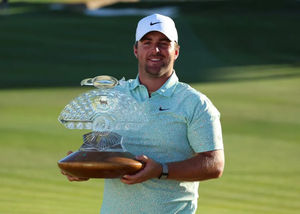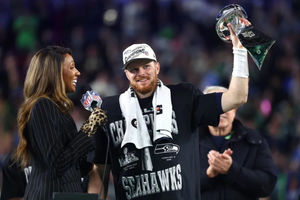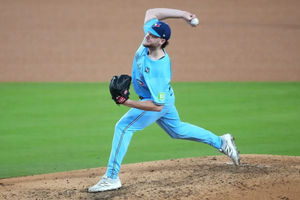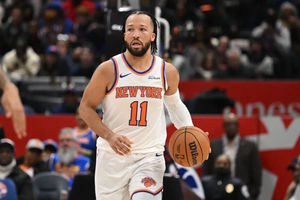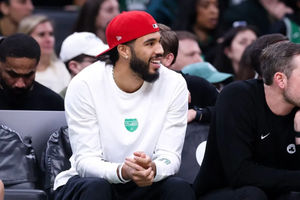Charles Barkley Has Nothing To Say To America

Yesterday was a very bad day, in some small part because NBA legend and Hall of Famer Charles Barkley was on television, and Charles Barkley was talking about something that was not the NBA.
Charles Barkley was on CNN, talking to host Brooke Baldwin in a pre-taped, wide-ranging interview in the wake of the events in Ferguson, Mo. (The very idea of this was surreal—can anyone imagine Steve Kerr being hauled in to discuss what it's like to be white in America?) To recap, 18-year-old Michael Brown was approached by Ferguson police officer Darren Wilson on August 9 and shot dead in broad daylight in front of witnesses, many of whom claimed he perished with his hands up in the universal sign of surrender. On November 24, prosecutor Robert McCulloch announced that Wilson wouldn't even have to go to court.
Yesterday was a very bad day mainly because after months of talking about what can be done to prevent the next Michael Brown from getting shot down— the demilitarization of police, perhaps, though body cameras would be a great start—the United States justice system, well-oiled machine that it is, failed another black man killed by police, and in doing so, did exactly what it was designed to do.
On July 17 in Staten Island, N.Y. 43-year-old Eric Garner was approached by NYPD officers after he helped break up a fight on his block. The officers asked if he was holding any loose cigarettes in an attempt to sell them tax-free.
"Every time you see me, you want to mess with me. I'm tired of it. It ends today," Garner said. He was angry. He felt harassed. After all, he'd been arrested 31 times before. "I'm minding my business, officer. Please just leave me alone. I told you the last time, please just leave me alone. Please.
"Please, don't touch me," Garner said as police approached to grab him. "Don't touch me."
Officer Daniel Pantaleo sunk a forearm deep under Garner's chin, and squeezed.
"I can't breathe," Garner said, as Pantaleo forced the large man to the ground. "I can't breathe. I can't breathe. I can't breathe. I can't breathe. I can't breathe. I can't breathe. I can't breathe. I can't breathe. I can't breathe. I can't breathe." And then Eric Garner died.
Those of us who care know how he died because a cell phone video of Garner's death was shot and uploaded to YouTube. Unlike Brown, there is no debate as to the sequence of events. It's right here.
While we spent the last four months making sounds about body cameras, a medical examiner deemed Garner's death a homicide. The asthmatic, overweight father of six succumbed to a choke from a NYPD officer—a maneuver that the NYPD itself has banned since 1993.
Yesterday, as Barkley's interview with Baldwin was being aired, the decision came in. A grand jury decided not to indict Pantaleo. He walked free.
Baldwin asked Barkley about Garner's death.
"I don't think that was a homicide," Barkley said.
"It was a choke hold," Baldwin said. "You see it."
"I think excessive force, something like that," Barkley allowed. "To go right to murder? When the cops are trying to arrest you, if you fight back, things go wrong.
"I don't think they were trying to kill Mr. Garner. You know, he was a big man. They tried to get him down. I don't see how you go to murder in that situation."
Do you see the problem here yet?
In October, ProPublica published a report that young, black men are 21 times as likely to be killed by police as young, white males. That's a lot of times! This is what Charles Barkley had to say about black people's relationship with police.
Let me just say this. The notion that white cops are just out there killing black people, that's ridiculous. That's just flat out ridiculous. And I challenge any black person to try to make that point. And this notion that cops—cops are actually awesome. And they're the only things in the ghetto between this place being the wild, wild west and so this notion that cops are out there just killing black men is ridiculous. And I hate that narrative coming out of this entire situation.
Do you see the problem here yet?
Barkley has long been hailed by conservatives and liberals by "telling it like it is," engaging in a conversation that most black folks are too ashamed or stupid or solipsistic to have. Liberal writer Jonathan Chait once called Barkley a political philosopher, praising him for being "critical of social pathologies within the black community."
Barkley is so beloved and so great on television because whether he's talking about the NBA or black pathology, he comes off as your own crazy, lovable uncle whose default mode always seems to be "fuck it."
But this isn't about an abstraction; this isn't your uncle telling it like it is to you over a beer, talking about how the kids ought to pull their damn pants up and get jobs. Those of us who care watched Garner being strangled to death by Pantaleo in broad daylight, essentially for being suspected of carrying loose cigarettes and for talking back to a police officer, and then heard the news trickle in that the grand jury couldn't even find probable cause to bring the officer to court.
This conversation is over; there is not debate to be had about the killing of Eric Garner, and there really isn't one to be had on the degradation, imprisonment, and systemic murder of minorities. It is a system of control, a machine, doing the work it was designed to do. Those who blame its workings on its victims, invoking black pathologies and enumerating all the ways in which black people need to become better and more moral to earn the right to complain about being killed without their killers even facing any consequences, are engaging in an old, tired respectability politics. They don't know what the fuck they're talking about.
Charles Barkley does not know what the fuck he's talking about.
And really, that's no great sin. The sin lies with the media who book him for pre-taped interviews, who see the American justice system perfectly fail the people it never was intended to protect and say, "Where's Chuck?"
The sin is not in talking without knowing what it is you're talking about, but in seeking out someone who doesn't know what he's talking about with a camera and a microphone, as if what he had to say mattered, or as if him offering his hard truths could deliver a kind of absolution. In giving Barkley and those like him a platform out of some sense of fairness, some sense that the natural counter to a fully justified rage is a lecture about how bad things happen when you don't submit to an arbitrary authority, some sense that there are hard truths that need to be spoken about how the problem with black people is black people, the media is allowing for the possibility that, maybe, Garner's video doesn't tell the whole story. Maybe you didn't see what you saw, and by extension, black and brown men and women really are somehow to blame for their deaths. Maybe the solution to the deaths of Eric Garner and Michael Brown and Tamir Rice and hundreds of years of state-sanctioned genocide is to just sit down with an old basketball player and talk a little bit more about all the ways in which black people are in the wrong.
The NBA’s Tanking Problem Is Getting Worse — Not Better
NBA Picks Tonight: Three Best Bets Before the All-Star Break
The Biggest Question Facing Every 2026 MLB Contender
Best NBA Betting Picks for Wednesday Feb. 11th Slate
- Early Super Bowl LXI Odds Favor Seahawks, Sleeper Betting Picks & More
- Sunday Feb 8th NBA Picks: Three Best Bets Today
- Super Bowl Betting Preview: Seahawks vs. Patriots Breakdown & Pick
- The Most Fun Super Bowl Prop Bets You Can Make This Year
- Super Bowl 60 Prop Bets: 10 Best Bets for Patriots vs. Seahawks
- UFC Fight Night at the Apex Best Betting Picks and Predictions
- NBA Betting Picks for Friday Feb. 6: Post-Deadline Predictions







